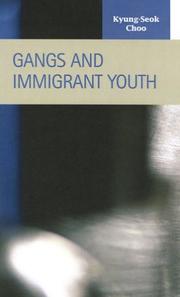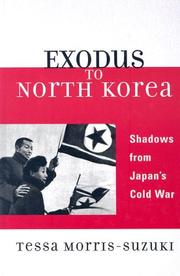| Listing 1 - 10 of 46 | << page >> |
Sort by
|
Book
ISBN: 1350988839 1786731851 1786721856 Year: 2017 Publisher: London ; New York : Bloomsbury Publishing,
Abstract | Keywords | Export | Availability | Bookmark
 Loading...
Loading...Choose an application
- Reference Manager
- EndNote
- RefWorks (Direct export to RefWorks)
"The indistinct status of the Zainichi has meant that, since the late 1940s, two ethnic Korean associations, the Chongryun (pro-North) and the Mindan (pro-South) have been vying for political loyalty from the Zainichi, with both groups initially opposing their assimilation in Japan. Unlike the Korean diasporas living in Russia, China or the US, the Zainichi have become sharply divided along political lines as a result. Myung Ja Kim examines Japan's changing national policies towards the Zainichi in order to understand why this group has not been fully integrated into Japan. Through the prism of this ethnically Korean community, the book reveals the dynamics of alliances and alignments in East Asia, including the rise of China as an economic superpower, the security threat posed by North Korea and the diminishing alliance between Japan and the US. Taking a post-war historical perspective, the research reveals why the Zainichi are vital to Japan's state policy revisionist aims to increase its power internationally and how they were used to increase the country's geopolitical leverage.With a focus on International Relations, this book provides an important analysis of the mechanisms that lie behind nation-building policy, showing the conditions controlling a host state's treatment of diasporic groups."--Bloomsbury Publishing.
Koreans --- Japan --- Ethnic relations.
Book
ISBN: 9004335331 900433453X Year: 2018 Publisher: Leiden ; Boston : Brill,
Abstract | Keywords | Export | Availability | Bookmark
 Loading...
Loading...Choose an application
- Reference Manager
- EndNote
- RefWorks (Direct export to RefWorks)
A Companion to Korean American Studies presents interdisciplinary works from a number of authors who have contributed to the field of Korean American Studies. This collection ranges from chapters detailing the histories of Korean migration to the United States to contemporary flows of popular culture between South Korea and the United States. The authors present on Korean American history, gender relations, cultural formations, social relations, and politics. Contributors are: Sohyun An, Chinbo Chong, Angie Y. Chung, Rhoanne Esteban, Sue-Je Lee Gage, Hahrie Han, Jane Hong, Michael Hurt, Rachael Miyung Joo, Jane Junn, Miliann Kang, Ann H. Kim, Anthony Yooshin Kim, Eleana Kim, Jinwon Kim, Ju Yon Kim, Kevin Y. Kim, Nadia Y. Kim, Soo Mee Kim, Robert Ji-Song Ku, EunSook Lee, Se Hwa Lee, S. Heijin Lee, Shelley Sang-Hee Lee, John Lie, Pei-te Lien, Kimberly McKee, Pyong Gap Min, Arissa H. Oh, Edward J.W. Park, Jerry Z. Park, Josephine Nock-Hee Park, Margaret Rhee and Kenneth Vaughan.
Korean Americans. --- Korean Americans --- Koreans
Book
ISBN: 9781614705468 1614705461 9781614703693 1614703698 Year: 2011 Publisher: Hauppauge, N.Y. Nova Science Publishers
Abstract | Keywords | Export | Availability | Bookmark
 Loading...
Loading...Choose an application
- Reference Manager
- EndNote
- RefWorks (Direct export to RefWorks)
Koreans --- Ethnology --- History. --- Korea --- Emigration and immigration
Book
ISBN: 9781784537678 9780755601035 9781786721853 1786721856 1784537675 9781786731852 9781350988835 1350988839 1786731851 Year: 2017 Publisher: London New York, NY
Abstract | Keywords | Export | Availability | Bookmark
 Loading...
Loading...Choose an application
- Reference Manager
- EndNote
- RefWorks (Direct export to RefWorks)
"The indistinct status of the Zainichi has meant that, since the late 1940s, two ethnic Korean associations, the Chongryun (pro-North) and the Mindan (pro-South) have been vying for political loyalty from the Zainichi, with both groups initially opposing their assimilation in Japan. Unlike the Korean diasporas living in Russia, China or the US, the Zainichi have become sharply divided along political lines as a result. Myung Ja Kim examines Japan's changing national policies towards the Zainichi in order to understand why this group has not been fully integrated into Japan. Through the prism of this ethnically Korean community, the book reveals the dynamics of alliances and alignments in East Asia, including the rise of China as an economic superpower, the security threat posed by North Korea and the diminishing alliance between Japan and the US. Taking a post-war historical perspective, the research reveals why the Zainichi are vital to Japan's state policy revisionist aims to increase its power internationally and how they were used to increase the country's geopolitical leverage.With a focus on International Relations, this book provides an important analysis of the mechanisms that lie behind nation-building policy, showing the conditions controlling a host state's treatment of diasporic groups."--Bloomsbury Publishing.
Koreans --- History --- Ethnic identity --- Japan --- Ethnic relations.
Book
ISBN: 0295990406 Year: 2009 Publisher: Seattle : University of Washington Press,
Abstract | Keywords | Export | Availability | Bookmark
 Loading...
Loading...Choose an application
- Reference Manager
- EndNote
- RefWorks (Direct export to RefWorks)
Koreans --- Cultural assimilation --- History --- Japan --- Korea --- Colonies --- Foreign relations
Book
ISBN: 1442662530 1442690380 1442611154 1442642181 Year: 2018 Publisher: Toronto : University of Toronto Press,
Abstract | Keywords | Export | Availability | Bookmark
 Loading...
Loading...Choose an application
- Reference Manager
- EndNote
- RefWorks (Direct export to RefWorks)
"Koreans are one of the fastest-growing visible minority groups in Canada today. However, very few studies of their experiences in Canada or their paths of integration are available to public and academic communities. Korean Immigrants in Canada provides the first scholarly collection of papers on Korean immigrants and their offspring from interdisciplinary, social scientific perspectives. The contributors explore the historical, psychological, social, and economic dimensions of Korean migration, settlement, and integration across the country. A variety of important topics are covered, including the demographic profile of Korean-Canadians, immigrant entrepreneurship, mental health and stress, elder care, language maintenance, and the experiences of students and the second generation. Readers will find interconnecting themes and synthesized findings throughout the chapters. Most importantly, this collection serves as a platform for future research on Koreans in Canada."--
Koreans --- Immigrant families --- History. --- Canada --- Emigration and immigration
Book
ISBN: 0739129562 Year: 2016 Publisher: Lanham, Maryland : Lexington Books,
Abstract | Keywords | Export | Availability | Bookmark
 Loading...
Loading...Choose an application
- Reference Manager
- EndNote
- RefWorks (Direct export to RefWorks)
This book takes a cross-national and comparative approach, beyond American models, to examine how members of a single ethnic group adapt differently to distinct host societies. In her study of Korean immigrants to Japan and the United States, Suzuki finds that the state's mode of reception and its racialization of migrants determine adaptation patterns.
Koreans --- Koreans --- Immigrants --- Immigrants --- Social conditions. --- Social conditions. --- Social conditions. --- Social conditions. --- Japan --- United States --- Race relations --- Political aspects. --- Race relations --- Political aspects.

ISBN: 1593322577 9781593322571 1593321481 9781593321482 Year: 2007 Publisher: New York LFB Scholarly Pub. LLC
Abstract | Keywords | Export | Availability | Bookmark
 Loading...
Loading...Choose an application
- Reference Manager
- EndNote
- RefWorks (Direct export to RefWorks)
Gangs --- Juvenile delinquents --- Korean Americans. --- Korean Americans --- Juvenile delinquency --- Violence --- Ethnology --- Koreans --- Social conditions.

ISBN: 0742554414 0742579387 9780742579385 9780742554412 0742554422 9780742554429 Year: 2007 Publisher: Lanham, Md. Rowman & Littlefield Publishers
Abstract | Keywords | Export | Availability | Bookmark
 Loading...
Loading...Choose an application
- Reference Manager
- EndNote
- RefWorks (Direct export to RefWorks)
Through travels that range from Geneva to Pyongyang, this remarkable book takes readers on an odyssey through one of the most extraordinary forgotten tragedies of the Cold War: the ""return"" of over 90,000 people, most of them ethnic Koreans, from Japan to North Korea from 1959 onward. For most, their new home proved a place of poverty and hardship; for thousands, it was a place of persecution and death. In rediscovering their extraordinary personal stories, this book also casts new light on the politics of the Cold War, and on present-day tensions between North Korea and the rest
Return migration --- Repatriation --- Koreans --- Cold War. --- History. --- Korea (North) --- Japan --- Foreign relations --- Cold War --- History
Book
ISBN: 1498508421 149850843X Year: 2015 Publisher: Lanham, Maryland : Lexington Books,
Abstract | Keywords | Export | Availability | Bookmark
 Loading...
Loading...Choose an application
- Reference Manager
- EndNote
- RefWorks (Direct export to RefWorks)
This book looks at two Korean communities, one in Sao Paulo and the other in Buenos Aires, in order to identify the global pulls that have affected Korean identity formation, community development patterns, integration efforts, social mobility, education for children, remigration, return migration, and relationships with the host communities.
Koreans --- Korean diaspora. --- Ethnic identity. --- Social conditions. --- São Paulo (Brazil) --- Buenos Aires (Argentina) --- Race relations.
| Listing 1 - 10 of 46 | << page >> |
Sort by
|

 Search
Search Feedback
Feedback About UniCat
About UniCat  Help
Help News
News